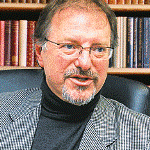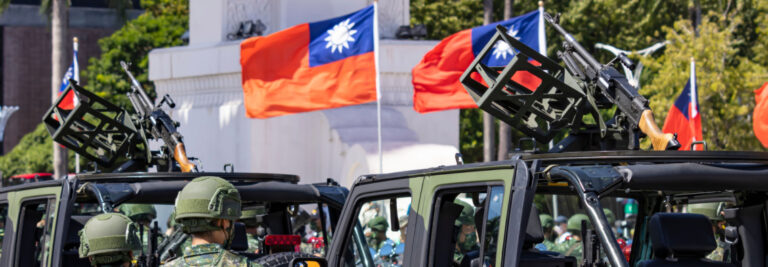John Tkacik directs the Future Asia Project at the International Assessment and Strategy Center in Alexandria, Virginia. He is a retired U.S. foreign service officer who served at U.S. embassies in both Taipei and Beijing, consulates in Hong Kong and Guangzhou, and in the Department of State where he was Chief of China Analysis in the Bureau of Intelligence and Research (INR).
When I was a young lad—just ten years old in 1960—I was honored to be an altar boy at a Catholic mass said by Monsignor Giuseppe Caprio, the Vatican’s newly appointed internuncio in Taipei at Saint Christopher’s Church on Chung-shan North Road. The good monsignor had run the Papal nunciature as an interim diplomat since 1951, and before that, he had been assigned to the nunciature in Nanking until his arrest in Nanchang by the Communists earlier that year. He was detained for three months before being deported via Hong Kong. I don’t remember him well, but he must have been a competent diplomat; he was later elevated to bishop, and in 1969 was re-assigned from Taipei to New Delhi. Pope John Paul II named him Cardinal in 1979 and he ultimately was Economic Secretary for the Holy See in Rome.
The Holy See’s diplomatic mission is probably the oldest one still standing in Taipei these days. The most recent Papal envoy in Taipei, Paul Fitzgerald Russell (陸思道), was elevated to archbishop and departed Taipei in April, after eight years’ service as the charge d’affaires, to become the nuncio to Turkey and Turkmenistan. He is replaced by Monsignor Doctor Slađan Ćosić (高德隆), himself a veteran Vatican diplomat at the European parliament in Strasbourg. It remains to be seen whether Msgr. Ćosić will have an extended tenure in Taipei, but I suspect he will.
Despite a year of fervid speculation on a breakthrough in talks between the Holy See and Beijing, the signs are unpromising that the Chinese government and the ruling communist party are ready to accede to Vatican insistence that Catholic bishops in China be subject to Vatican approval. In 2010, three years of talks on the subject broke down and the Holy See was obliged to instruct Chinese Catholic bishops to boycott meetings convened by the Chinese Patriotic Catholic Association (CPCA); auxiliary bishop of Shanghai Thaddeus Ma (馬達欽) denounced the CPCA from the pulpit and immediately was placed under house arrest. The CPCA proceeded to name eight new bishops without Vatican approval, at which point the Holy See declared the illicitly ordained bishops to be excommunicated.
Beijing may have felt some pressure from the move because, in 2015, talks resumed with the Vatican, which Papal Secretary of State, Cardinal Pietro Parolin, termed “very positive.” In October, while the papal delegation was in Beijing, Pope Francis assured an interviewer from Paris Match magazine that “China is always in my heart.” In June, evidently under instructions from the Vatican, Bishop Thaddeus Ma “admitted his faults” and said he should not have distanced himself from the CPCA. Last month, on August 4, Cardinal John Tong (湯漢樞) of Hong Kong published an article on the Catholic website Kung Kao Po (公教報) indicating that the Chinese authorities were close to an understanding on the appointment of bishops.
Alas, the official Chinese foreign language publication Global Times responded with its own sanctioned analysis on August 19, praising the Vatican’s new flexibility, but reiterating that “the Chinese government still seems somewhat suspicious.” The commentator reminded his readers that the Chinese Communist Party (CCP) organ, the People’s Daily had “published three articles reiterating the importance of ‘sinicization’ and asking religious groups to ‘resist control from a foreign version of the same religion.’” The commentator added ingenuously, “This was the first time this phrase was used, and it is believed to have been aimed at the Vatican.” He pointed out that it is also Party doctrine that “our country’s religions are not subordinate to foreign religions” (我國宗教與外國宗教在互不隸屬), a stock phrase in common usage among the Party’s United Front Work Department (UFWD) and the State Administration for Religious Affairs (SARA). He stressed that, even after Cardinal Tong’s August 4 pastoral letter, head of SARA Wang Zuoan warned on August 7 that citizens “be alert to attempts of ‘hostile foreign forces’ to alter China’s ideology and political system through the use of religion.”
Almost as an afterthought, the Global Times commentator nonchalantly cited a Chinese scholar at Purdue University that “Beijing may gain more benefits from this deal … because the Vatican will first cut its official ties with Taiwan.”
It was a clear signal that Beijing’s official media see breaking diplomatic ties with Taiwan as the Chinese government’s absolute precondition for the Holy See. While Beijing’s religious officials seek to distract the Holy See’s diplomats with reassurances that “flexibility” on the Vatican’s part will smooth the way on matters of apostolic succession in the Chinese church, their primary focus is breaking the Vatican’s position on Taiwan. Once that’s accomplished there is no further Vatican leverage in the talks and no further incentive for Chinese “flexibility.” The Chinese state will pocket the winnings and walk away from the table.
One hopes that the Vatican’s diplomats, with nearly two millennia of institutional experience behind them, are a match for Chinese negotiators with their own two millennia history of barbarian handling.
Taipei, at least, seems to be playing its vulnerable hand with skill. Vice President Chen Chien-jen’s mission to Rome earlier this month (September 4) for the canonization of Mother Teresa was an outward success in both diplomatic and humanitarian terms. The Vice President is a devout Catholic: he received a sympathetic welcome from Cardinal Parolin and had an emotional audience with Pope Francis himself. He made a pilgrimage to the town of Assisi, the birthplace of the Pope’s 13th Century namesake, and made an emergency aid donation to the Italian villages destroyed in the August 24 earthquakes. Upon his departure, the Vice President averred that Taiwan “maintains good and sustainable relations” with the Vatican. One can only hope.
The main point: Beijing’s official media see breaking diplomatic ties with Taiwan as the Chinese government’s absolute precondition for the Holy See.




